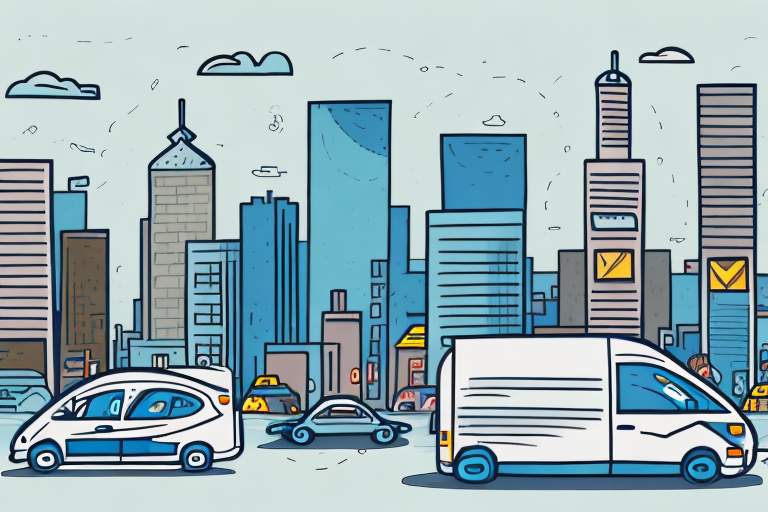Understanding Mission Courier Jobs
If you're interested in a career in the transportation and logistics industry, you may have heard about mission courier jobs. But what exactly is a mission courier job? And what are the benefits of working in this field? In this article, we'll answer these questions and more as we dive into the world of mission courier jobs.
What is a Mission Courier Job and How Does it Differ from Other Courier Jobs?
A mission courier job is a specialized role within the courier industry that involves delivering important documents, packages, and materials to specific locations. Unlike standard courier roles, mission couriers handle high-priority, time-sensitive assignments that require quick and efficient delivery.
Mission couriers may work for a variety of clients, including government agencies, businesses, organizations, and individuals. Common tasks include transporting sensitive documents, delivering medical supplies and equipment, and moving materials for research and development.
One key difference between mission courier jobs and regular courier positions is the level of security and confidentiality involved. Mission couriers often handle sensitive and confidential information, necessitating strict adherence to protocols and procedures to ensure the safety and privacy of the materials they transport.
Additionally, mission courier roles demand a high degree of flexibility and adaptability. Couriers may need to travel to remote or hard-to-reach locations, work irregular hours, and navigate unexpected challenges. Therefore, mission couriers must be adept at making quick decisions to ensure the success of their assignments.
The History of Mission Courier Jobs: From Ancient Times to the Present Day
The origins of mission courier jobs can be traced back to ancient civilizations, where messengers were essential for delivering important messages and information. Over centuries, the courier role evolved, becoming integral to military campaigns, political intelligence, and business transactions.
In the modern era, the significance of mission courier jobs has grown with the rise of globalization and international trade. As businesses expand globally, the need for rapid and reliable delivery of goods and materials has become more critical.
Technological advancements have also transformed mission courier roles, incorporating the delivery of digital information and documents. Electronic couriers, or e-couriers, have emerged as a popular option for businesses and individuals needing to send important files and data swiftly and securely.
Despite technological progress, traditional mission courier roles remain vital across various industries. From delivering medical supplies to remote areas to transporting sensitive government documents, mission couriers continue to play a crucial role in today's fast-paced world.
Different Types of Missions Couriers Can Undertake
Mission couriers engage in a variety of tasks depending on their clients and the nature of their work. Some common types of missions include:
- Medical Deliveries: Transporting essential medical supplies and equipment to healthcare facilities, especially in emergency situations or remote locations.
- Government Document Transport: Delivering sensitive government documents, contracts, and classified information between departments or agencies.
- Research and Development Materials: Moving materials and samples for scientific research, ensuring timely delivery to laboratories and research centers.
- Legal Documents: Handling the delivery of important legal papers, contracts, and court documents with a high degree of confidentiality.
- Corporate Deliveries: Transporting critical business materials, such as prototypes, inventory, and confidential reports, between corporate offices.
Benefits and Challenges of Being a Mission Courier
The Pros and Cons of Working as a Mission Courier
Like any profession, working as a mission courier comes with its set of advantages and challenges.
Pros:
- High-Priority Assignments: Opportunity to work on important and impactful missions.
- Competitive Pay: Potential for higher earnings compared to standard courier roles, especially for specialized missions.
- Travel Opportunities: Ability to travel to diverse locations, including remote or international destinations.
- Skill Development: Enhances problem-solving, time management, and adaptability skills.
Cons:
- High Stress: Managing time-sensitive and critical deliveries can be stressful.
- Long Hours: Assignments may require working irregular or extended hours.
- Potential Danger: Handling sensitive deliveries in volatile or high-risk areas can pose safety risks.
- High Responsibility: Mistakes can have serious consequences, requiring meticulous attention to detail.
Understanding the Importance of Safety Standards in Mission Courier Jobs
Mission couriers often operate in high-pressure and high-risk environments, making adherence to strict safety standards paramount. Key safety practices include:
- Proper Handling Protocols: Following established procedures for handling and transporting sensitive materials to prevent damage or loss.
- Use of Safety Gear: Utilizing appropriate protective equipment to ensure personal safety and the security of deliveries.
- Risk Assessment: Conducting thorough assessments of routes and destinations to identify and mitigate potential risks.
- Training and Certification: Completing necessary training programs and obtaining certifications related to safety and secure transportation.
- Emergency Preparedness: Being prepared to handle emergencies, including having contingency plans for unexpected events.
Career Aspects of Mission Courier Jobs
What Skills and Personal Qualities are Required for a Career in Mission Courier Jobs?
Prospective mission couriers should cultivate a specific set of skills and personal attributes to excel in this field:
- Strong Communication Skills: Effectively communicating with clients, dispatchers, and team members.
- Time Management: Prioritizing and managing time efficiently to meet tight deadlines.
- Ability to Work Under Pressure: Maintaining composure and effectiveness in high-stress situations.
- Sense of Responsibility: Taking ownership of assignments and ensuring accurate deliveries.
- Commitment to Safety: Adhering to safety protocols and procedures consistently.
- Adaptability: Adjusting to changing routes, schedules, and unexpected challenges.
- Physical Fitness: Handling physical tasks, such as lifting and transporting packages.
- Attention to Detail: Ensuring accuracy in deliveries and documentation to prevent errors.
How Much Can You Expect to Earn as a Mission Courier?
The compensation for mission couriers varies based on factors such as experience, employer, and the nature of assignments. As of 2023, the average salary for mission couriers in the United States is approximately $45,000 per year, according to data from Glassdoor.
In addition to base salaries, many mission courier positions offer benefits such as health insurance, retirement plans, and paid time off. Some employers may also provide bonuses or incentives for completing assignments efficiently and effectively. It's essential to consider the overall compensation package, including these additional benefits, when evaluating potential job opportunities.
Success Stories from Real-Life Mission Couriers: Inspiring Tales from the Frontlines
Real-life mission couriers often share inspiring stories of their experiences, highlighting the challenges they've overcome and the impactful work they've accomplished:
- Emergency Medical Deliveries: One courier recounts delivering critical medical supplies to disaster-stricken areas, saving lives by ensuring timely access to essential equipment.
- Government Document Transport: Another success story involves securely transporting classified documents across international borders, playing a pivotal role in diplomatic negotiations.
- Scientific Research Support: A courier shares their experience delivering sensitive research materials to laboratories, contributing to groundbreaking scientific discoveries.
These stories underscore the vital role of mission couriers in various sectors and inspire others to pursue a career in this dynamic and impactful field.
Industry Trends and Future of Mission Courier Jobs
The Future of Mission Courier Jobs: Trends and Predictions for the Industry
The transportation and logistics industry is continually evolving, and mission courier jobs are set to become even more integral in the coming years. Key trends shaping the future of mission courier roles include:
- Automation and Artificial Intelligence: Increasing use of AI for route optimization, package tracking, and predictive analytics to enhance efficiency.
- Drone Technology: Adoption of drones for faster and more flexible deliveries, particularly in remote or congested areas.
- Global Supply Chain Expansion: Continued growth of international trade necessitates more robust and reliable courier services.
- Eco-Friendly Delivery Options: Rising demand for sustainable delivery methods, such as electric vehicles and alternative fuels, to reduce the carbon footprint.
- Last-Mile Delivery Innovations: Emphasis on improving the efficiency and speed of the final leg of the delivery process to meet consumer expectations.
The Role of Technology in Modern-Day Mission Courier Services
Technology plays a crucial role in enhancing the capabilities and efficiency of mission courier services. Some of the key technologies currently in use include:
- GPS Tracking: Real-time tracking systems allow clients and employers to monitor the location and status of deliveries, ensuring transparency and accountability.
- Automated Dispatch Systems: Streamlined dispatch processes enable efficient assignment of missions based on courier availability and expertise.
- Biometric Authentication: Enhanced security measures, such as fingerprint or facial recognition, to verify the identity of couriers and ensure secure deliveries.
- Mobile Applications: Advanced apps facilitate communication, route planning, and real-time updates between couriers and clients.
- Blockchain Technology: Ensures the integrity and security of transactions and documentation associated with deliveries.
A Day in the Life of a Mission Courier: What to Expect on the Job
A typical day for a mission courier is dynamic and varied, often involving multiple tasks and interactions. Here's what a day might look like:
- Morning Briefing: Reviewing assignments, routes, and any specific instructions or security protocols.
- Package Preparation: Ensuring all materials are securely packaged and labeled correctly, verifying contents against shipment documents.
- Travel: Navigating to various locations, which may include hospitals, government buildings, corporate offices, or research facilities.
- Delivery Execution: Handing off packages to designated recipients, ensuring signatures or biometric verifications as required.
- Communication: Maintaining contact with dispatchers and clients, providing updates and reporting any issues encountered.
- Documentation: Completing necessary paperwork or digital logs to record delivery details and confirm successful completion of missions.
- End-of-Day Review: Assessing the day's performance, addressing any challenges, and preparing for the next day's assignments.
How to Build a Successful Career in the Fast-Paced World of Mission Courier Services
Building a successful career as a mission courier involves a combination of skill development, networking, and staying informed about industry advancements. Here are some steps to help you achieve your career goals:
- Develop Relevant Skills: Focus on honing communication, time management, and problem-solving skills. Consider specialized training in areas like secure transport or emergency response.
- Gain Experience: Start with entry-level courier positions to build a foundation and gain practical experience handling various types of deliveries.
- Obtain Certifications: Pursue certifications related to transportation security, hazardous materials handling, or other relevant fields to enhance your qualifications.
- Network with Professionals: Join industry associations, attend conferences, and connect with other couriers and logistics professionals to expand your network.
- Stay Updated on Industry Trends: Keep abreast of technological advancements, regulatory changes, and new best practices in the courier industry.
- Seek Advanced Opportunities: Aim for roles with greater responsibility, such as supervisory positions or specialized courier assignments, to advance your career.
Applying for Mission Courier Jobs
How to Apply for a Mission Courier Job: Tips and Tricks for Landing Your Dream Job
Securing a mission courier position involves strategic preparation and presentation. Here are some tips to enhance your chances of getting hired:
- Build a Strong Resume: Highlight relevant experience, skills, and certifications that align with mission courier roles. Emphasize any previous courier or logistics positions, as well as experience in handling sensitive materials.
- Network with Industry Professionals: Connect with individuals working in the courier and logistics sectors. Networking can lead to job referrals and insights into available opportunities.
- Research Potential Employers: Understand the companies you're applying to, their mission, values, and the specific requirements of their courier roles. Tailor your application to reflect alignment with their needs.
- Highlight Relevant Experience: Include any experience in logistics, transportation, or high-pressure environments. Showcase your ability to manage time effectively and handle confidential information.
- Emphasize Key Skills: Detail your problem-solving abilities, attention to detail, and capacity to work under pressure. Provide examples of how you've successfully managed challenging assignments.
- Prepare for Interviews: Research common interview questions for mission courier positions and practice your responses. Demonstrate your knowledge of the industry and your enthusiasm for the role.
- Professional Presentation: Dress appropriately for interviews and ensure punctuality. A professional demeanor can make a strong positive impression.
- Follow Up: After interviews, send a thank-you note to express your appreciation for the opportunity and reiterate your interest in the position.
By following these strategies, you can position yourself as a strong candidate and increase your likelihood of landing your desired mission courier job.
Conclusion
Mission courier jobs offer a unique and rewarding career path within the transportation and logistics industry. With opportunities to engage in high-priority assignments, competitive compensation, and the chance to make a tangible impact, this role is ideal for individuals who thrive in dynamic and challenging environments. By developing the necessary skills, adhering to safety standards, and staying informed about industry trends, you can build a successful and fulfilling career as a mission courier.






















